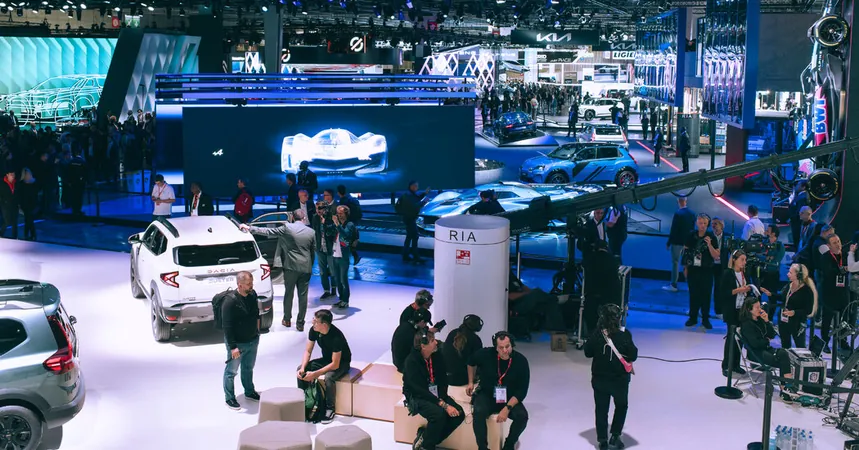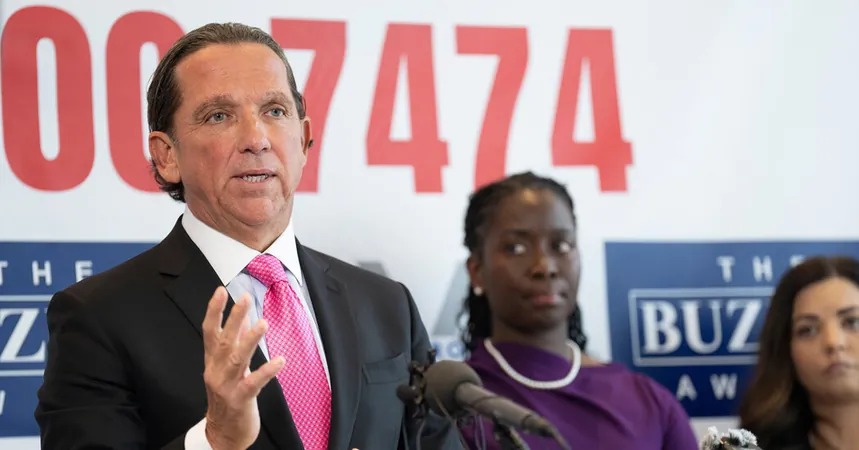
Chinese Automakers Make Bold Statement at Paris Auto Show Amid Tariff Challenges
2024-10-15
Author: Yan
Introduction
As the Paris Motor Show unfolds, China's ambitions to penetrate the European car market are more pronounced than ever. This year's event, featuring an unprecedented number of Chinese automakers, has highlighted their relentless push to introduce cutting-edge electric vehicles, even as the European Union prepares to impose anti-subsidy tariffs.
Chinese Automakers at the Show
Prominent names like BYD, Leapmotor, and Xpeng drew significant crowds, showcasing groundbreaking technology, including artificial intelligence integrations, aimed at outpacing their European rivals in the electric vehicle (EV) race.
Europe's Response to EV Transition
Europe is on a mission to transition entirely to electric vehicles by 2035, a challenge taken seriously by major players such as Renault, Stellantis, BMW, and Volkswagen, who presented various new models catering to European consumers.
Tariff Challenges
Despite facing potential barriers, including tariffs of up to 45% effective October 31 and lasting for five years, Chinese manufacturers demonstrated an unwavering determination to penetrate the lucrative European market.
BYD's Expansion Efforts
BYD, which debuted in Europe just two years ago, boasted seven models that the company claims utilize advanced electric and hybrid technologies superior to those offered by local competitors.
Response from Chinese Executives
Stella Li, BYD's executive vice president, expressed confidence, stating that a remarkable quarter of all hybrid and electric vehicles sold globally in the first half of 2023 were manufactured by BYD. Li criticized the impending tariffs set by Brussels, labeling them as inequitable, a sentiment echoed by several other Chinese manufacturers.
Negotiations on Tariffs
Notably, negotiations are reportedly underway between European and Chinese officials to find a resolution to the concerns surrounding alleged unfair advantages in China's automotive sector.
Strategic Moves by BYD
Meanwhile, BYD has announced plans to further expand its footprint in Europe, introducing a new SUV in France and Germany while also reducing prices on existing models to attract more consumers.
European Automakers' Response
European car companies, feeling the heat from Asian competitors, are responding by ramping up their own electric vehicle offerings. Renault's CEO, Luca de Meo, introduced a line of compact electric vehicles made from 90% renewable materials, framing it as “a manifesto for technological innovation.”
Challenges for European Automakers
However, the landscape for European automakers is daunting. With an overall drop in car sales approximating 18% compared to pre-pandemic levels, and electric vehicle sales stagnating at only 12% of the market share, established automakers face mounting pressure.
Support from French Government
In a move signaling solidarity with the domestic auto industry, French President Emmanuel Macron attended the show, highlighting support for local manufacturers by test-driving one of Renault's new hybrid models.
New Partnerships in the Industry
Understanding the futility of resistance, Stellantis — the conglomerate that owns Peugeot, Citroen, Jeep, and Chrysler — is pivoting strategy by forming a partnership with Leapmotor, a leading Chinese EV manufacturer.
Future Collaborations
Leapmotor's CEO, Jiangming Zhu, emphasized the joint venture’s goal to deliver an affordable electric vehicle tailored to European consumers, with a compact model projected to have a starting price just above $19,600.
Conclusion
The Paris Auto Show not only illustrates the dynamic interplay between Chinese and European automakers but also raises the stakes for the future of electric mobility across the continent. Will Chinese firms redefine the EV market in Europe, or can established players reclaim their dominance? The battle for the hearts and wallets of European consumers has only just begun.





 Brasil (PT)
Brasil (PT)
 Canada (EN)
Canada (EN)
 Chile (ES)
Chile (ES)
 España (ES)
España (ES)
 France (FR)
France (FR)
 Hong Kong (EN)
Hong Kong (EN)
 Italia (IT)
Italia (IT)
 日本 (JA)
日本 (JA)
 Magyarország (HU)
Magyarország (HU)
 Norge (NO)
Norge (NO)
 Polska (PL)
Polska (PL)
 Schweiz (DE)
Schweiz (DE)
 Singapore (EN)
Singapore (EN)
 Sverige (SV)
Sverige (SV)
 Suomi (FI)
Suomi (FI)
 Türkiye (TR)
Türkiye (TR)